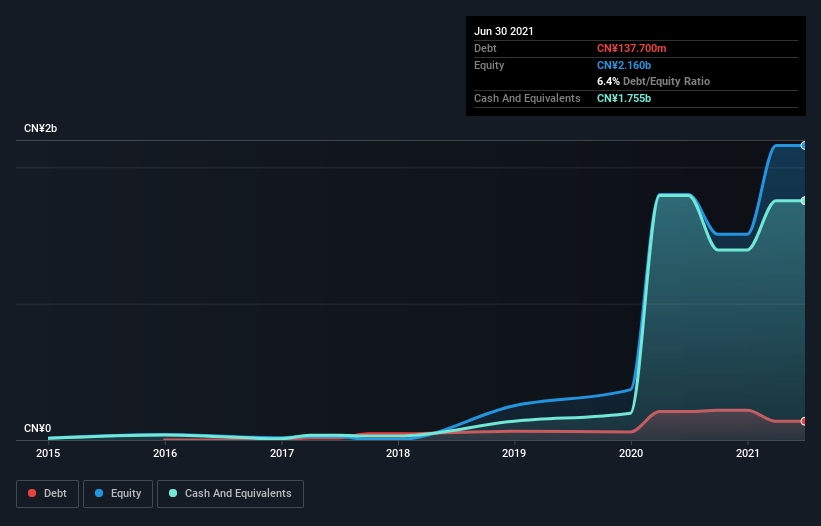Does Kintor Pharmaceutical (HKG:9939) Have A Healthy Balance Sheet?

Warren Buffett famously said, 'Volatility is far from synonymous with risk.' When we think about how risky a company is, we always like to look at its use of debt, since debt overload can lead to ruin. We note that Kintor Pharmaceutical Limited (HKG:9939) does have debt on its balance sheet. But the real question is whether this debt is making the company risky.
What Risk Does Debt Bring?
Debt and other liabilities become risky for a business when it cannot easily fulfill those obligations, either with free cash flow or by raising capital at an attractive price. In the worst case scenario, a company can go bankrupt if it cannot pay its creditors. However, a more common (but still painful) scenario is that it has to raise new equity capital at a low price, thus permanently diluting shareholders. Of course, plenty of companies use debt to fund growth, without any negative consequences. When we examine debt levels, we first consider both cash and debt levels, together.
See our latest analysis for Kintor Pharmaceutical
How Much Debt Does Kintor Pharmaceutical Carry?
As you can see below, Kintor Pharmaceutical had CN¥137.7m of debt at June 2021, down from CN¥208.2m a year prior. However, its balance sheet shows it holds CN¥1.76b in cash, so it actually has CN¥1.62b net cash.

A Look At Kintor Pharmaceutical's Liabilities
We can see from the most recent balance sheet that Kintor Pharmaceutical had liabilities of CN¥70.0m falling due within a year, and liabilities of CN¥170.9m due beyond that. Offsetting this, it had CN¥1.76b in cash and CN¥141.3m in receivables that were due within 12 months. So it can boast CN¥1.66b more liquid assets than total liabilities.
This short term liquidity is a sign that Kintor Pharmaceutical could probably pay off its debt with ease, as its balance sheet is far from stretched. Simply put, the fact that Kintor Pharmaceutical has more cash than debt is arguably a good indication that it can manage its debt safely. When analysing debt levels, the balance sheet is the obvious place to start. But ultimately the future profitability of the business will decide if Kintor Pharmaceutical can strengthen its balance sheet over time. So if you're focused on the future you can check out this free report showing analyst profit forecasts.
Given its lack of meaningful operating revenue, Kintor Pharmaceutical shareholders no doubt hope it can fund itself until it has a profitable product.
So How Risky Is Kintor Pharmaceutical?
By their very nature companies that are losing money are more risky than those with a long history of profitability. And in the last year Kintor Pharmaceutical had an earnings before interest and tax (EBIT) loss, truth be told. And over the same period it saw negative free cash outflow of CN¥763m and booked a CN¥639m accounting loss. Given it only has net cash of CN¥1.62b, the company may need to raise more capital if it doesn't reach break-even soon. Overall, its balance sheet doesn't seem overly risky, at the moment, but we're always cautious until we see the positive free cash flow. The balance sheet is clearly the area to focus on when you are analysing debt. However, not all investment risk resides within the balance sheet - far from it. For example, we've discovered 3 warning signs for Kintor Pharmaceutical (1 is concerning!) that you should be aware of before investing here.
If, after all that, you're more interested in a fast growing company with a rock-solid balance sheet, then check out our list of net cash growth stocks without delay.
If you're looking to trade Kintor Pharmaceutical, open an account with the lowest-cost platform trusted by professionals, Interactive Brokers.
With clients in over 200 countries and territories, and access to 160 markets, IBKR lets you trade stocks, options, futures, forex, bonds and funds from a single integrated account.
Enjoy no hidden fees, no account minimums, and FX conversion rates as low as 0.03%, far better than what most brokers offer.
Sponsored ContentValuation is complex, but we're here to simplify it.
Discover if Kintor Pharmaceutical might be undervalued or overvalued with our detailed analysis, featuring fair value estimates, potential risks, dividends, insider trades, and its financial condition.
Access Free AnalysisHave feedback on this article? Concerned about the content? Get in touch with us directly. Alternatively, email editorial-team (at) simplywallst.com.
This article by Simply Wall St is general in nature. We provide commentary based on historical data and analyst forecasts only using an unbiased methodology and our articles are not intended to be financial advice. It does not constitute a recommendation to buy or sell any stock, and does not take account of your objectives, or your financial situation. We aim to bring you long-term focused analysis driven by fundamental data. Note that our analysis may not factor in the latest price-sensitive company announcements or qualitative material. Simply Wall St has no position in any stocks mentioned.
About SEHK:9939
Kintor Pharmaceutical
A clinical-stage biotechnology company, engages in researching, developing, and commercializing therapeutic drugs for dermatology and tumors indications with the unmet medical needs in the People’s Republic of China.
Moderate with mediocre balance sheet.
Market Insights
Community Narratives



